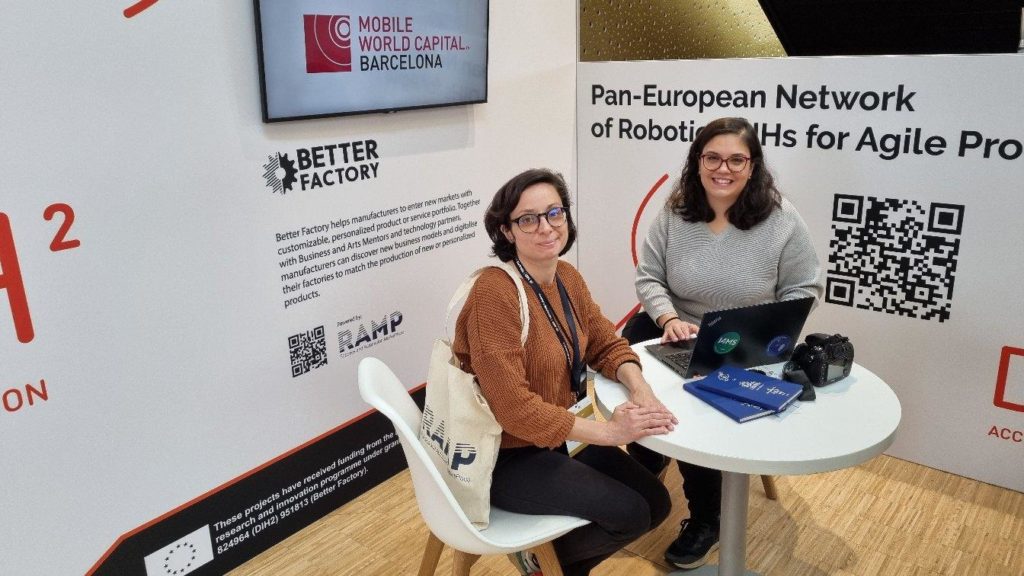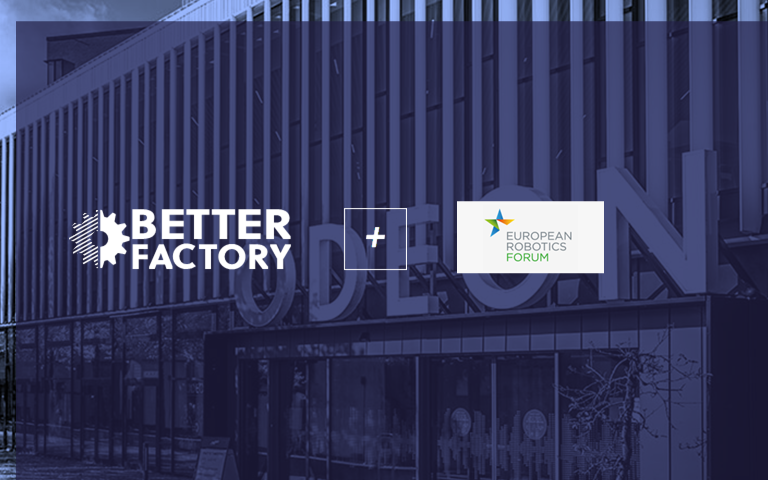Better Factory, a project that aims to improve manufacturing processes through the use of robotics, participated in the 2023 European Robotics Forum (ERF2023) held in Odense, Denmark from March 14 to 16.
The event was an opportunity for participants to explore first-hand how public, industrial, commercial, and scientific organizations are collaborating around robotics. Better Factory was part of the DIH2 booth and showcased its activities.
The first talk discussed the impact of digital innovation hubs (DIHs) on the development and commercialization of robotics solutions for SMEs. The workshop was structured around two main topics: the impact created by DIH networks in terms of services for SMEs, and the future of DIH networks and the challenges they face. The panel consisted of five EU-funded robotics projects, including TRINITY, RIMA, DIH-HERO, DIH2, and agROBOfood, which collectively provided financial support and services to over 180 European robotics SMEs.
The discussion centered on lessons learned and challenges faced by SMEs in bringing their robotics solutions to the market. The panelists shared their experiences with different DIH networks and the services they provided to SMEs, and the audience participated in an online poll and Q&A session. The speakers also discussed the future of DIH networks and how they can continue to provide services and accelerate the market introduction of robotics. The discussion highlighted the importance of community involvement and the need for DIHs to address the needs of SMEs across different industries, such as healthcare, agri-food, maintenance and inspection, and agile production. The intended outcome of the workshop was to gather information about community involvement and services offered by DIHs and to pave the way for future networks in serving companies not only within their region but also across Europe.

ERF2023 covered all aspects and current themes related to the field of robotics, with researchers, engineers, managers, entrepreneurs, businesspersons, and public funding officers from all over Europe coming together to discuss technology push and market pull, and how innovation in robotics and robotics-related AI can be accelerated.
The following co-hosted sessions with S+T+ARTS Prize and VOJEXT were focused on artistic collaboration in robotics and how cross-disciplinary collaboration between artists and industry can drive innovation, and strengthen organizations’ creative capabilities. The talks provided valuable insights into the potential for collaboration between artists and industry, highlighting the importance of cross-disciplinary partnerships in fostering creativity, problem-solving, social acceptance of robotic technologies in manufacturing. Three recently initiated artist residencies in robotic and manufacturing were launched as part of ERF2023 events. VOJEXT S+T+ARTS Residency winners – Marielena Papandreou, Calin Segal, and Anna Schaffner presented their projects which for the next 10 months will be exploring the potential for human robot collaboration in construction, arts and crafts as well as experimenting with issues of trust and comfort in human-robot collaboration. Through these sessions, participants had the opportunity to discuss the possibilities, value and challenges of interdisciplinary approaches in new technology design, embedding artists in organizational structures and less voiced topics such as ethical and fair design in the context of human-robot interaction in workspaces.
Overall, this presence at the European Robotics Forum helped to promote the importance of cross-disciplinary collaboration and innovation in art and industry.
The speakers and participants in the session were as follows:
- Aldo Sollazzo, an architect, computational designer, and educator based in Milan, Italy. Sollazzo is the founder of Noumena, a design and technology consultancy that specializes in digital fabrication, robotic automation, and artificial intelligence.
- Panos Sakkas, an architect and educator based in Athens, Greece. Sakkas is a co-founder of the Urban Transcripts research collective, which explores the relationship between urban space and society through design, research, and cultural production.
- Gareth Neal, a furniture maker and designer based in London, UK. Neal’s work blends traditional woodworking techniques with digital technologies such as CNC milling and laser cutting, creating pieces that are both contemporary and rooted in tradition.
- Jelle Feringa, a designer and educator based in Rotterdam, Netherlands. Feringa is a co-founder of The New Raw, a design and research studio that explores the intersection of digital fabrication, circular economy, and social innovation.
The talks were moderated by Zeynep Birsel, Concept & Project Developer, and Natalia Vargas, Project Manager MAKE at Waag Future Lab, a research organization that works in a trans-disciplinary team of designers, artists and scientists, utilizing public research methods in the realms of technology and society.

